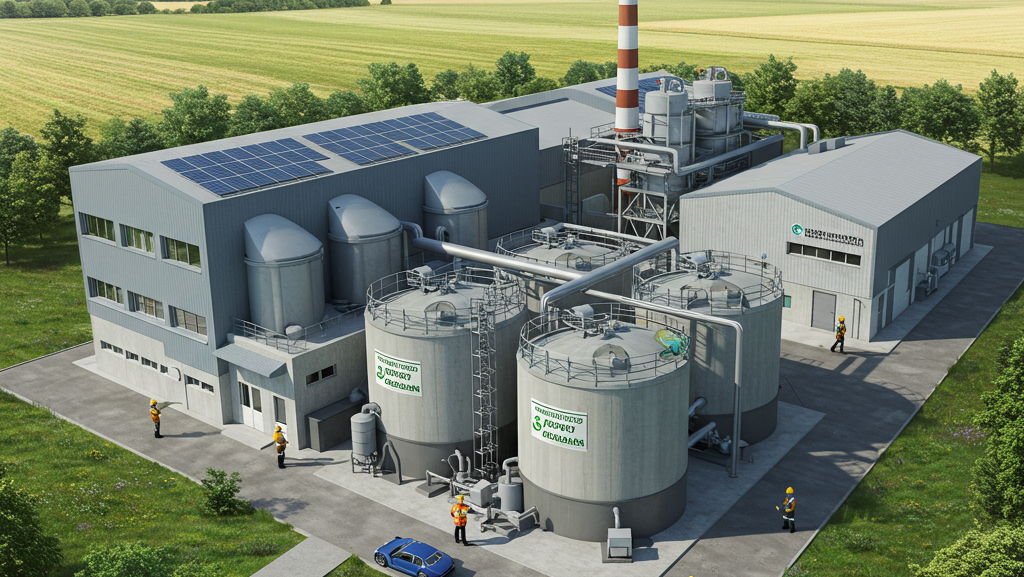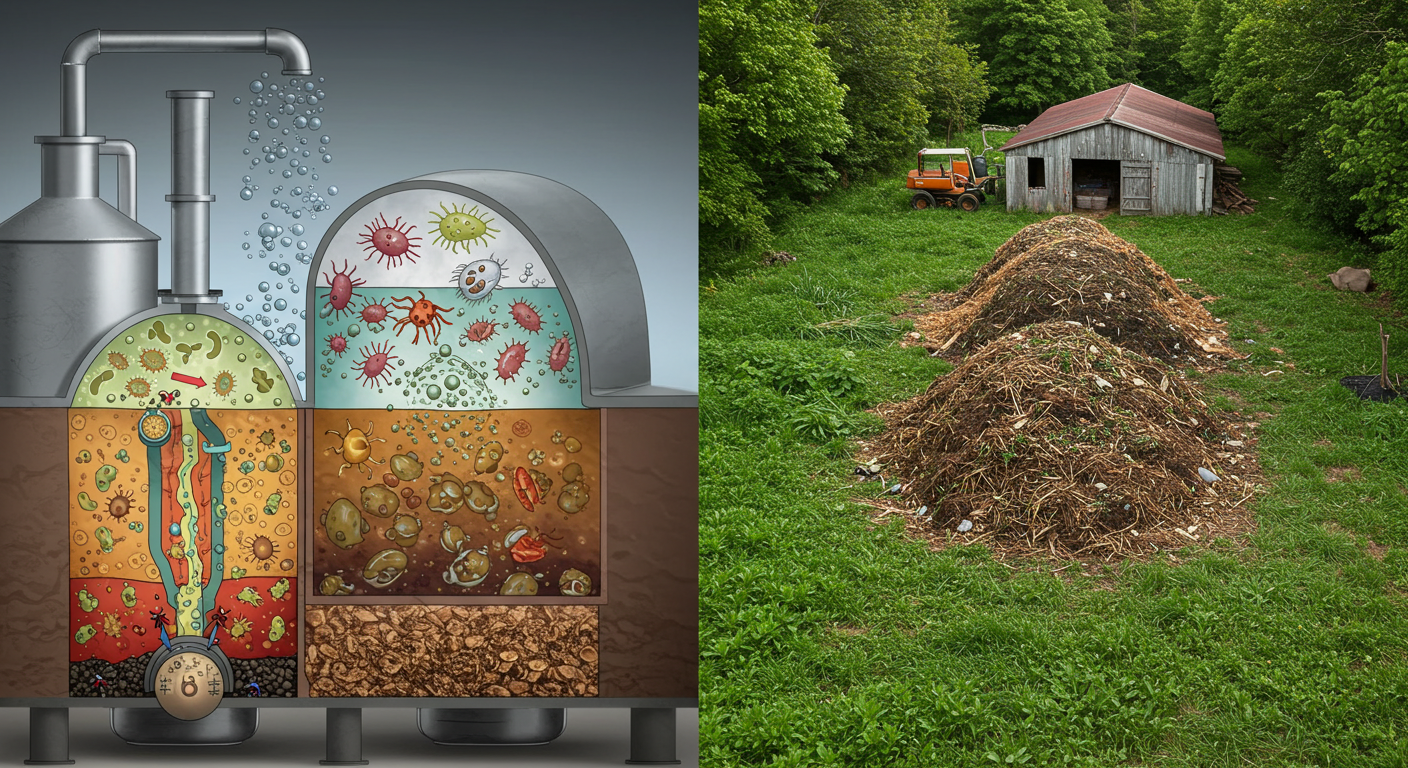Project Overview: Harnessing Organic Waste for Energy
Mupundu Energy’s 2.5 MW anaerobic digestion project represents a significant milestone in the pursuit of renewable energy solutions. This innovative facility is designed to convert organic waste into biogas, which is then transformed into electricity, thereby contributing to sustainability and energy efficiency. The capacity of 2.5 MW illustrates the potential to generate substantial energy from various waste streams while minimizing environmental impacts.
Central to the project is the use of diverse feedstock. The facility will leverage agricultural residues, livestock manure, and food waste as primary inputs. Agricultural residues, such as crop leftovers, pose disposal challenges and create opportunities for energy generation. Similarly, livestock manure not only presents an environmental concern but also serves as an abundant and valuable resource for biogas production. Food waste, which often ends up in landfills, will be redirected to the facility, thus reducing greenhouse gas emissions associated with conventional waste management practices.
The advanced anaerobic digestion technology employed in this project is crucial for maximizing biogas output. This process involves the breakdown of organic material by microorganisms in an oxygen-free environment, yielding biogas as a byproduct. This biogas primarily consists of methane, which can be utilized to produce electricity through combustion in generators. The process not only aids in energy production but also promotes the reduction of organic waste in landfills, further underscoring the project’s environmental benefits.
Additionally, Mupundu Energy’s commitment to energy efficiency is embedded in the design of the facility. By optimizing the anaerobic digestion process, the project aims to enhance energy recovery and minimize operational costs, making it a frontline solution in the broader context of renewable energy initiatives. The integration of such advanced technology not only facilitates sustainable energy production but also aligns with global green energy goals.
Environmental Impact: Mitigating Climate Change and Managing Waste
The implementation of Mupundu Energy’s 2.5 MW anaerobic digestion project represents a significant step towards addressing the pressing environmental challenges related to waste management and climate change. At the core of this initiative is the anaerobic digestion technology, which effectively captures methane—a potent greenhouse gas—produced during the decomposition of organic waste. By utilizing this methane for energy production, the project mitigates the impact of greenhouse gas emissions, thereby contributing to global climate change mitigation efforts.
Research indicates that methane has a global warming potential over 25 times that of carbon dioxide over a century. By capturing this gas from organic materials before it escapes into the atmosphere, Mupundu Energy not only reduces potential air pollution but also promotes a cleaner and more sustainable energy source. This innovative approach is essential in the fight against climate change, as it aligns with the objectives of reducing carbon footprints and transitioning to renewable energy systems.
Furthermore, the anaerobic digestion process offers an environmentally responsible alternative for managing organic waste. Traditional waste disposal methods, such as landfill usage, generate significant environmental repercussions, including land degradation, water contamination, and greenhouse gas emissions. In contrast, anaerobic digestion transforms organic materials into biogas and digestate, which can be repurposed as a renewable energy source and a nutrient-rich fertilizer, respectively. This closed-loop system not only diverts waste from landfills but also contributes to soil health and agricultural productivity.
Through these integrative benefits, Mupundu Energy’s anaerobic digestion project exemplifies how sustainable practices can lead to substantial environmental improvements. This initiative plays a crucial role in fostering a circular economy, where waste is minimized, resources are optimized, and ecological footprints are reduced. With the urgency of climate change calling for actionable solutions, the project’s impact on greenhouse gas reduction and sustainable waste management represents a significant stride towards achieving green energy goals.
Economic and Community Benefits: Empowering Local Economies
The implementation of Mupundu Energy’s 2.5 MW anaerobic digestion project signifies not only an advance in renewable energy technology but also a transformative opportunity for local economies. This project is expected to create a myriad of job opportunities throughout its lifecycle—encompassing phases such as construction, operation, and maintenance. The construction phase will demand a skilled workforce, generating temporary employment for local laborers, engineers, and construction managers, thus injecting capital into the community. Once operational, the facility will require a dedicated team for day-to-day management, maintenance, and oversight, resulting in ongoing job stability and growth within the region.
Moreover, energy security is significantly enhanced as this anaerobic digestion project offers a reliable, renewable source of energy. By harnessing organic waste materials, the project reduces reliance on fossil fuels, mitigating the volatility associated with traditional energy markets. As communities transition to renewable energy sources, such as biogas, they not only gain energy independence but also contribute to broader environmental goals, such as the reduction of greenhouse gas emissions.
In addition to economic advantages, the anaerobic digestion project fosters various community benefits. For instance, by producing clean cooking fuel, the initiative addresses pressing health and environmental concerns associated with traditional biomass fuels, which often lead to respiratory problems and deforestation. Furthermore, the by-products of the anaerobic digestion process, such as organic fertilizers, can markedly improve agricultural productivity. Local farmers will be empowered by access to sustainable fertilizer alternatives, promoting better soil health and crop yields, which in turn benefits food security in the community.
Ultimately, the synergy between economic growth and community enhancement presented by the anaerobic digestion project positions it as a cornerstone for sustainable development in the region.
Future Expansion: Scaling Up for Greater Impact
Mupundu Energy has demonstrated a commitment to advancing renewable energy solutions through its 2.5 MW anaerobic digestion project. As the demand for sustainable energy sources continues to rise, the company is poised for future growth, with plans to significantly increase its biogas production capacity. This expansion is crucial not only for fulfilling current energy needs but also for aligning with broader renewable energy goals.
The expansion strategy encompasses several key initiatives aimed at enhancing the efficiency and output of anaerobic digestion processes. By investing in cutting-edge technology and conducting comprehensive research and development, Mupundu Energy aims to refine the methodologies associated with biogas generation. This focus on innovation will help streamline operations, reduce waste, and ultimately result in a more sustainable energy production model.
Additionally, Mupundu Energy acknowledges the importance of collaboration within the renewable energy sector. The company plans to engage with expert partners in the fields of biotechnology and environmental science to explore advanced digestion technologies and optimize biogas yields. Such partnerships will provide crucial insights and best practices that can be adapted to their projects, leading to enhanced performance and scalability.
In scaling up their anaerobic digestion capabilities, Mupundu Energy also recognizes the potential socio-economic benefits. Enhanced biogas production not only addresses the energy demands of growing communities but also fosters job creation and energy security. By positioning itself to expand its operations, Mupundu Energy is committed to making a tangible impact on local economies while advancing towards a greener future.
Ultimately, the vision for future expansion reflects Mupundu Energy’s dedication to leading the transition towards renewable energy through innovative practices and a strong emphasis on sustainability. As they work to increase their biogas output, they will contribute to the essential goal of reducing greenhouse gas emissions and promoting a healthier planet.





